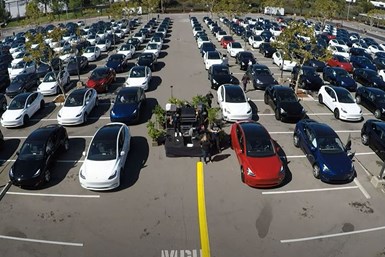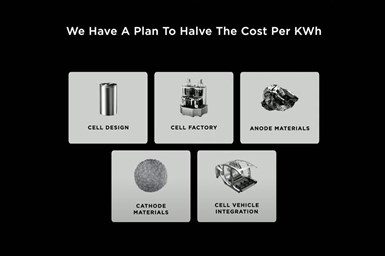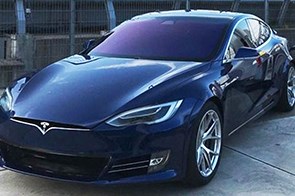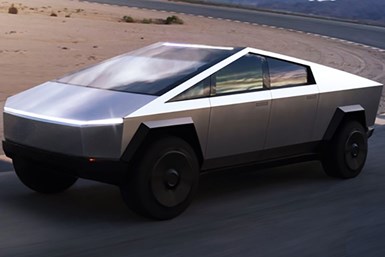Tesla Outlines Next-Gen Battery and Other Future Plans
Breakthrough battery tech and $25,000 EV teased, but Wall Street wasn’t impressed
#hybrid
More than 270,000 online viewers tuned in to a livestream of Tesla’s so-called Battery Day presentation on Tuesday.
The highly anticipated event, which was held in conjunction with the carmaker’s annual stockholder meeting, also attracted 240 shareholders. They attended in person, seated in their own Model 3 electric cars, as CEO Elon Musk and other executives spoke from a stage set up in the parking lot of Tesla’s Palo Alto, Calif., facility.

Attendees showed their enthusiasm by honking their horns. They had a lot to honk about…ranging from Tesla’s next-generation battery technology and a $25,000 EV it could enable to the upcoming Model S Plaid, mounting Cybertruck preorders, more sophisticated Autopilot features, integrated aluminum casting processes and ultra-high-volume goals.
But…
Investors, however, were underwhelmed. To put it mildly.
There was general disappointment about the lack of details regarding new products. Another concern: Nothing was said about the long-rumored million-mile battery.
Musk had tried to temper expectations with Tweets earlier in the day that explained how difficult it is to quickly ramp up new technology.
Tesla’s skyrocketing stock still took a major blow. Share prices closed down 5.6% and continued to tumble in after-hours trading. By Wednesday morning, Tesla had lost about $50 billion in market value.
But there was plenty of excitement. Here are some of the highlights:
About the Battery
Dubbed the “biscuit tin,” the new battery promises to provide five times more energy and six times more power than Tesla’s current battery system. The technology will boost driving range by 16% and cut battery costs in half, according to the carmaker.

The benefits are attributed to improvements in cell design, advanced materials for the anode and cathode, greater integration and new manufacturing processes.
The batteries maintain Tesla’s current lithium-ion chemistry but feature a larger (46 mm x 80 mm) cylindrical design. Tesla also removed the tabs that act as the positive and negative connection points between the anode and cathode and the battery casing.
Other enhancements include what’s described as “laser-patterned” foils. This creates a shingled spiral that yields a fivefold shorter electrical path (50 mm versus 250 mm) for electrons to travel.
Tesla already has started pilot production of the new cells and aims to ramp up output to 10 gigawatt hours per year by the end of 2021 at an assembly line near its Fremont, Calif., vehicle plant. Within three years, Tesla expects to achieve an annual rate of 3 terawatt-hours (3,000 gigawatt-hours), which would be 85 times greater than the capacity of the Nevada “Gigafactory” operated by Tesla and Panasonic.
A $25,000 Car?
The battery improvements and lower manufacturing costs could enable a $25,000 EV that Musk envisions launching by as soon as 2023.
"We're confident that long-term we can design and manufacture a compelling $25,000 electric vehicle," Musk says.
Musk has teased such a vehicle, which could be called the Model C or Model 2, several times in recent months. But he offered few details other than the potential timing—and analysts were quick to point out that Tesla has frequently missed production targets on previous projects.
Plaid Sightings
The long-awaited Model S Plaid edition will be launched late next year. Pricing starts at $134,500.

Tesla Model S Plaid
The range-topping 1,100-hp vehicle will be capable of racing from zero to 60 mph in less than two seconds, while covering the quarter-mile in under nine seconds. Top speed is listed at more than 200 mph.
Tesla claims the car will have a driving range of 520 miles. This would surpass the 517-mile range of Lucid Motors upcoming Air sedan.
Tesla tested the car on Sunday at Laguna Seca Raceway in Monterey, Calif. It took just over one minute and 30 seconds to circle the track. If verified, this would be a track record. Check out a video of the run here.
Want a Cybertruck? Get in Line
Tesla estimates it has received about 600,000 preorders for its rugged Cybertruck.

Cybertruck
The orders require a $100 refundable deposit. Deliveries are expected to start by the end of 2021.
In addition to the model unveiled last November, Tesla is considering a small version for international markets.
Improved Autopilot
Tesla also is preparing to release a “full self-driving” beta version of its semi-autonomous Autopilot system in coming months.
The upgrade required a “fundamental rewrite” of the entire software stack.
“We're now labeling 3D video, which is hugely different from when we were previously labeling single 2D images," Musk explains. “The sophistication of the neural net of the car and the overall logic of the car is improved dramatically. It’s profound."
A Lot More Teslas
One of the most interesting tidbits from the presentation relates to Tesla’s long-term sales goals.
The carmaker aims to eventually increase annual volume to a whopping 20 million units. By comparison, Tesla currently is on pace to sell about 480,000 vehicles in 2020. This would be a 30% hike over last year’s record tally.
It also would make Tesla the world’s largest carmaker. By far. Last year, global vehicle production—for all automakers—totaled 88.9 million units.
RELATED CONTENT
-
On Fuel Cells, Battery Enclosures, and Lucid Air
A skateboard for fuel cells, building a better battery enclosure, what ADAS does, a big engine for boats, the curious case of lean production, what drivers think, and why Lucid is remarkable
-
on lots of electric trucks. . .Grand Highlander. . .atomically analyzing additive. . .geometric designs. . .Dodge Hornet. . .
EVs slowdown. . .Ram’s latest in electricity. . .the Grand Highlander is. . .additive at the atomic level. . .advanced—and retro—designs. . .the Dodge Hornet. . .Rimac in reverse. . .
-
The U.S. Military Finds New Roads: Fuel Cell Powered Pickups
While it seems that fuel efficiency as related to the U.S. federal government is all about light duty vehicles, that’s far from being the case.








